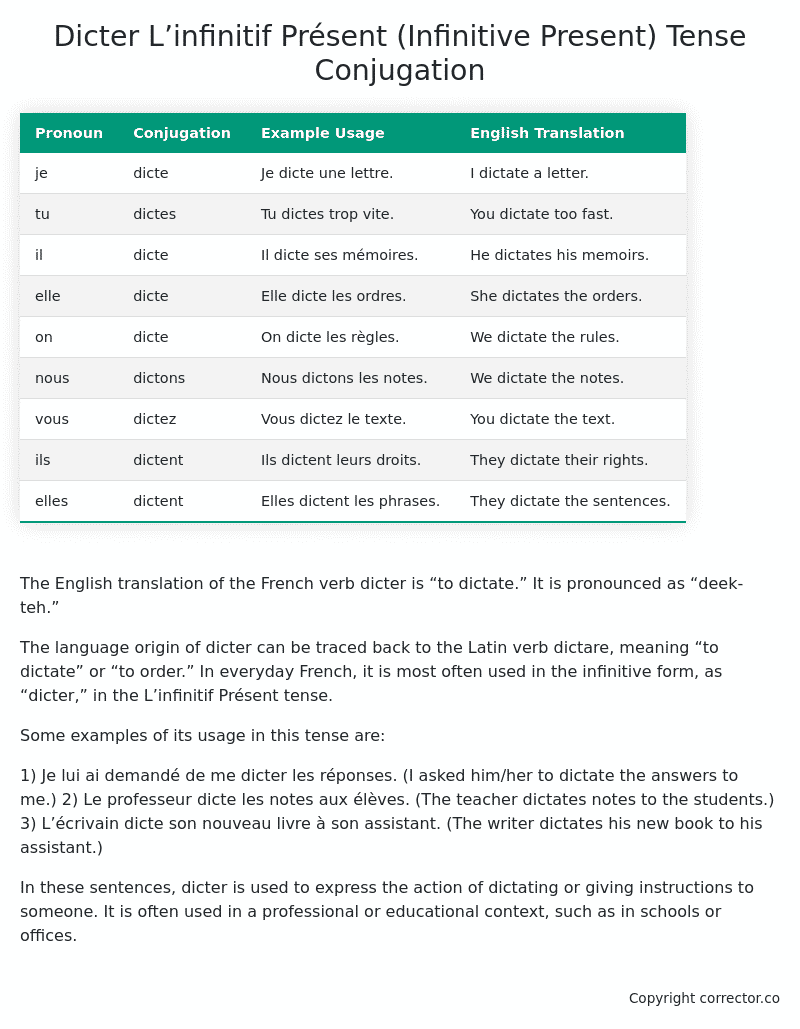L’infinitif Présent (Infinitive Present) Tense Conjugation of the French Verb dicter
Introduction to the verb dicter
The English translation of the French verb dicter is “to dictate.” It is pronounced as “deek-teh.”
The language origin of dicter can be traced back to the Latin verb dictare, meaning “to dictate” or “to order.” In everyday French, it is most often used in the infinitive form, as “dicter,” in the L’infinitif Présent tense.
Some examples of its usage in this tense are:
1) Je lui ai demandé de me dicter les réponses. (I asked him/her to dictate the answers to me.)
2) Le professeur dicte les notes aux élèves. (The teacher dictates notes to the students.)
3) L’écrivain dicte son nouveau livre à son assistant. (The writer dictates his new book to his assistant.)
In these sentences, dicter is used to express the action of dictating or giving instructions to someone. It is often used in a professional or educational context, such as in schools or offices.
Table of the L’infinitif Présent (Infinitive Present) Tense Conjugation of dicter
| Pronoun | Conjugation | Example Usage | English Translation |
|---|---|---|---|
| je | dicte | Je dicte une lettre. | I dictate a letter. |
| tu | dictes | Tu dictes trop vite. | You dictate too fast. |
| il | dicte | Il dicte ses mémoires. | He dictates his memoirs. |
| elle | dicte | Elle dicte les ordres. | She dictates the orders. |
| on | dicte | On dicte les règles. | We dictate the rules. |
| nous | dictons | Nous dictons les notes. | We dictate the notes. |
| vous | dictez | Vous dictez le texte. | You dictate the text. |
| ils | dictent | Ils dictent leurs droits. | They dictate their rights. |
| elles | dictent | Elles dictent les phrases. | They dictate the sentences. |
Other Conjugations for Dicter.
Le Present (Present Tense) Conjugation of the French Verb dicter
Imparfait (Imperfect) Tense Conjugation of the French Verb dicter
Passé Simple (Simple Past) Tense Conjugation of the French Verb dicter
Passé Composé (Present Perfect) Tense Conjugation of the French Verb dicter
Futur Simple (Simple Future) Tense Conjugation of the French Verb dicter
Futur Proche (Near Future) Tense Conjugation of the French Verb dicter
Plus-que-parfait (Pluperfect) Tense Conjugation of the French Verb dicter
Passé Antérieur (Past Anterior) Tense Conjugation of the French Verb dicter
Futur Antérieur (Future Anterior) Tense Conjugation of the French Verb dicter
Subjonctif Présent (Subjunctive Present) Tense Conjugation of the French Verb dicter
Subjonctif Passé (Subjunctive Past) Tense Conjugation of the French Verb dicter
Subjonctif Imparfait (Subjunctive Imperfect) Tense Conjugation of the French Verb dicter
Subjonctif Plus-que-parfait (Subjunctive Pluperfect) Tense Conjugation of the French Verb dicter
Conditionnel Présent (Conditional Present) Tense Conjugation of the French Verb dicter
Conditionnel Passé (Conditional Past) Tense Conjugation of the French Verb dicter
L’impératif Présent (Imperative Present) Tense Conjugation of the French Verb dicter
L’infinitif Présent (Infinitive Present) Tense Conjugation of the French Verb dicter (this article)
Struggling with French verbs or the language in general? Why not use our free French Grammar Checker – no registration required!
Get a FREE Download Study Sheet of this Conjugation 🔥
Simply right click the image below, click “save image” and get your free reference for the dicter L’infinitif Présent tense conjugation!

Dicter – About the French L’infinitif Présent (Infinitive Present) Tense
Forming the Infinitive Present
Common Everyday Usage Patterns
As a Verb’s Dictionary Form
After Modal Verbs
As an Imperative
In Infinitive Clauses
Interactions with Other Tenses
Present Tense
Future Tense
Conditional Tense
Passé Composé
Imperfect Tense
Subjunctive and Conditional Moods
Summary
Want More?
I hope you enjoyed this article on the verb dicter. Still in a learning mood? Check out another TOTALLY random French verb conjugation!


